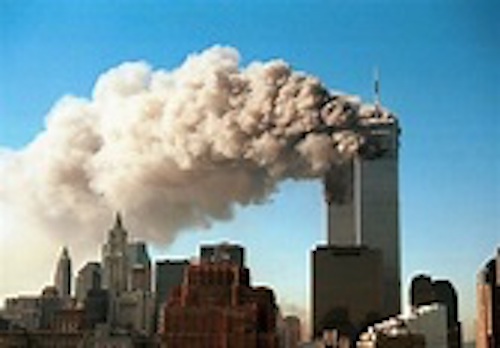I’m writing this as the national media in the United States are already well into rolling out their retrospective “packages” to mark the twentieth anniversary of September 11. Last night’s PBS NewsHour featured Garrett M. Graff, author of The Only Plane in the Sky: An Oral History of 9/11. The New York Times has been adding updates in a series of thematic verticals for more than a week.
It’s still a bit early, if you ask me. If there is anything that would be actually commemorative of September 11, it is the element of blind and blank surprise, the emotion of merely moving forward, quaking fear muffled by the need for action.
I’ve written about this before—and so many others have too, evoking that cloudless blue, still sky that I myself also saw around 8:30 a.m. that morning, the sun shining over Reagan National Airport and the Potomac River, as I turned onto the 14th Street bridge. That sky was still shimmering a couple of hours later, as I threaded through a traffic jam on an eighth of a tank of gas, then paying in quarters for a tiny top-off that would get me the rest of the way home, not knowing if I’d live or die.
Maybe I’m just listening to and reading the wrong things, but in all these retrospectives, I have only seen the cogitations of journalists and pundits and academics—and precious little exploration of 9/11’s effect on fiction. There are two reasons for that, I think, one being that it may take a while to adjudge the quality of fictional treatments of events that are still relatively recent. The other is that we’re now in such a vastly different cultural moment that it is hard to imagine the texture of times that seemed more publicly placid.
That’s something that Claire Messud’s novel The Emperor’s Children captures perfectly. Published in 2006, The Emperor’s Children is (by my highly unscientific reckoning) one of the earlier “September 11” books, and somewhat atypical, rendered in sparkling prose. The intricate plot involves the relationships of a number of New Yorkers circa 1999-2000. Two pages in— “There was, for Danielle Minkoff, only New York. Her work was there, her friends were there—even her remote acquaintances from college at Brown ten years ago were there—and she had made her home in the cacophonous, cozy comfort of the Village”—and I can already devise a prospective drinking game based on the tropes and signifiers of privilege.
And yet maybe it’s an indication of my own pre-September-11 life—frivolity in New York!—that I mostly found the characters in this social drama charming and naïve, rather than colonialist and hegemonic. (Look at the title, though: Messud is not neglecting either.)
Now that I’m thinking about it, The Emperor’s Children might mimic the unexpected aspect of the day itself, because the towers do not fall until page 411 of a 479-page book. Tellingly, it’s the beginning of a chapter titled “The Day After”—the emphasis on the world that’s been lost, rather than the world that’s just begun, and blasting apart the assumptions that have, until now, cushioned the protagonists’ world.
Not so with Helen Schulman’s 2007 novel A Day at the Beach, which opens on the morning of the day itself, and the day itself encompasses the whole of the novel’s action. The central figures are an unhappy downtown couple, a newly-fired choreographer and his ex-dancer wife, at odds over the raising of their autistic son. Of all the September 11 books, it’s this one that best depicts the myriad small, random decisions that governed how we moved through that day. Gerard Falktopf, the husband, finds himself in a blasted ATM with a solo tourist, then brings her along as he tries to shepherd his family to the car, a race against time to the Long Island Expressway and a borrowed house in the Hamptons.
A funny thing about that book, A Day at the Beach: A couple of years ago, I picked the book off the shelf of a friend’s vacation house in Martha’s Vineyard, where we’ve regularly stayed over the past ten years. I was probably halfway through reading it when I realized that I had already read it, seven or eight years before, and had remembered nothing. I had forgotten this particular set of privileged characters, utterly—it was the tense scramble to get out of the city that had finally made me recall it.
It was also in Martha’s Vineyard, pulling from the same shelf during another summer, that I read Don DeLillo’s Falling Man—the title of which, of course, references the famous photograph of the man falling from the windows of the World Trade Center. I thought the prose in Falling Man was taut and lovely, a meditation on a man psychologically “falling,” but of the rest of the book, I remember absolutely nothing.
Some guy named James Macdonald on amazon.com liked it more than I did, though, then jolted me into my own fond recognition:
“However, if you have not yet read Collin McCann’s Let the Great World Spin, I suggest you read this short novel first. McCann provides an equally well written narrative that counterpoints the magic and wonder of the high wire walker in 1974 with the tragedy at the same site 27 years later. It is the most positive and spiritually moving consideration of the books I have read that consider 9-11 and it is one of the best novels I have ever read.”
How could I have forgotten? Let The Great World Spin—published 2009—is one of the best novels I’ve ever read. So much so that, eight years after reading it on a plane to Mississippi, I can still in my mind feel around the contours of rooms and gardens and sidewalks within its pages. I can still feel the piercing feeling of grief I can sense from the two Vietnamese mothers, one from a Manhattan coop and one from the Bronx. And, above all, the uneasy exhilaration of Philippe Petit setting his wire between Towers South and North.
I hadn’t even remembered the connection to September 11, though how obvious it seems to me now—and after work, I’m off again upstairs to riffle through its pages.
I just glanced at all I’ve written above, and find myself more than a little embarrassed at how many times I said that there was something I didn’t remember.
And yet the things I DO remember…that’s because it was literature that served to transmogrify events of the news into meaning—into History.
Caroline Langston was a regular contributor to Image’s Good Letters blog, and is writing a memoir about the U.S. cultural divide. She has contributed to Sojourners’ God’s Politics blog, and aired several commentaries on NPR’s All Things Considered, in addition to writing book reviews for Image, Books and Culture, and other outlets. She is a native of Yazoo City, Mississippi, and a convert to the Eastern Orthodox Church. She lives outside Washington, D.C., with her husband and two children.





